University History Essay: Debates Surrounding Canadian Confederation
VerifiedAdded on 2022/08/25
|9
|1302
|15
Essay
AI Summary
This essay delves into the contentious debates surrounding the Confederation of 1867, a pivotal moment in Canadian history. It meticulously examines the arguments both in favor of and against the Confederation, exploring the economic, political, and social factors that shaped these viewpoints. The essay highlights the perspectives of various groups, including merchants, Irish Catholics, and British colonists, and their differing motivations and concerns. It analyzes the merits and demerits of the Confederation, the impact on the economy, political stability, and the relationship with the United States. The author provides a comprehensive overview of the historical context, key figures, and events. The essay draws on multiple sources to evaluate whether the Confederation of 1867 was a beneficial decision for Canada, offering a well-supported conclusion based on the evidence presented, including the impact of tariffs, government funding, and foreign investment.
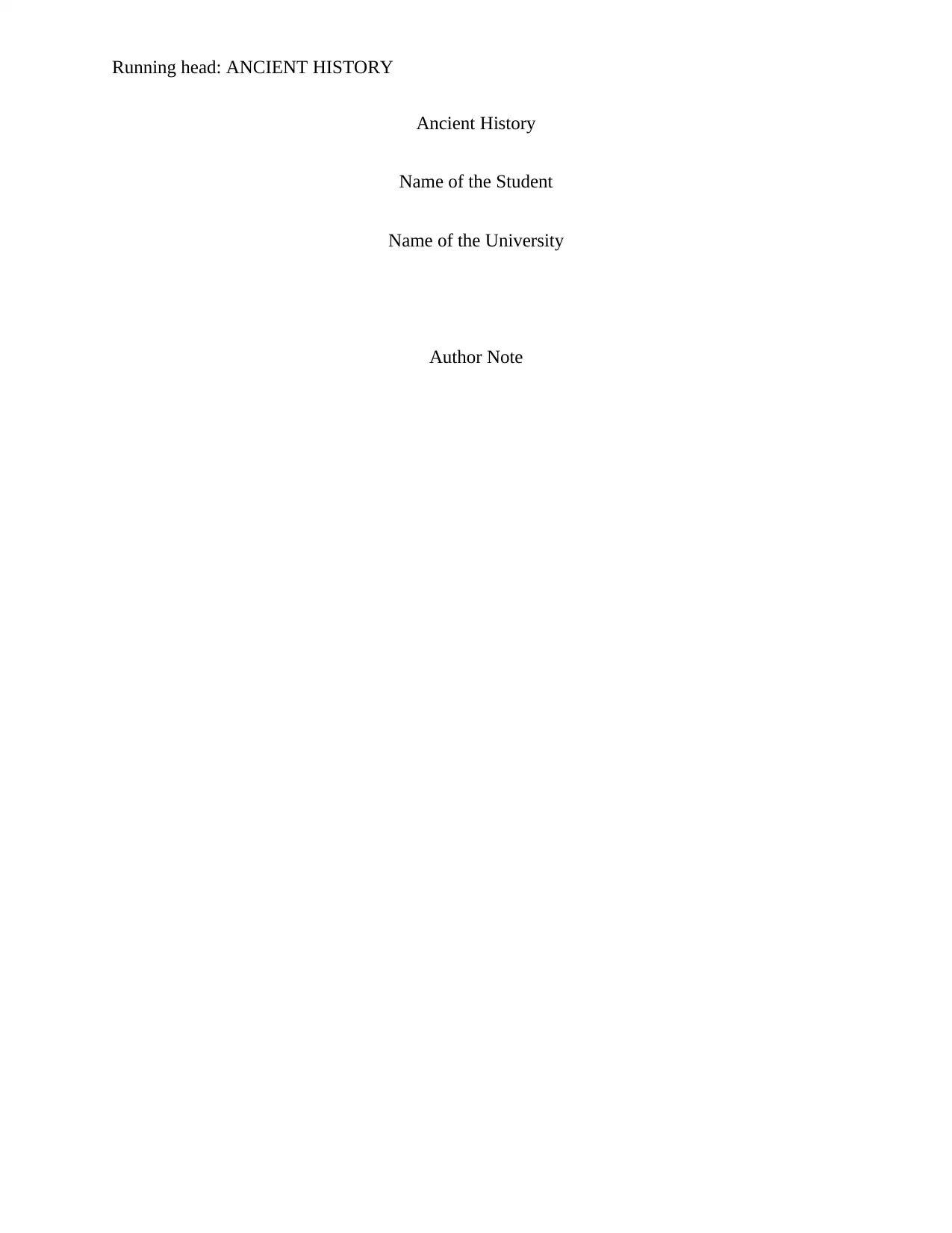
Running head: ANCIENT HISTORY
Ancient History
Name of the Student
Name of the University
Author Note
Ancient History
Name of the Student
Name of the University
Author Note
Paraphrase This Document
Need a fresh take? Get an instant paraphrase of this document with our AI Paraphraser
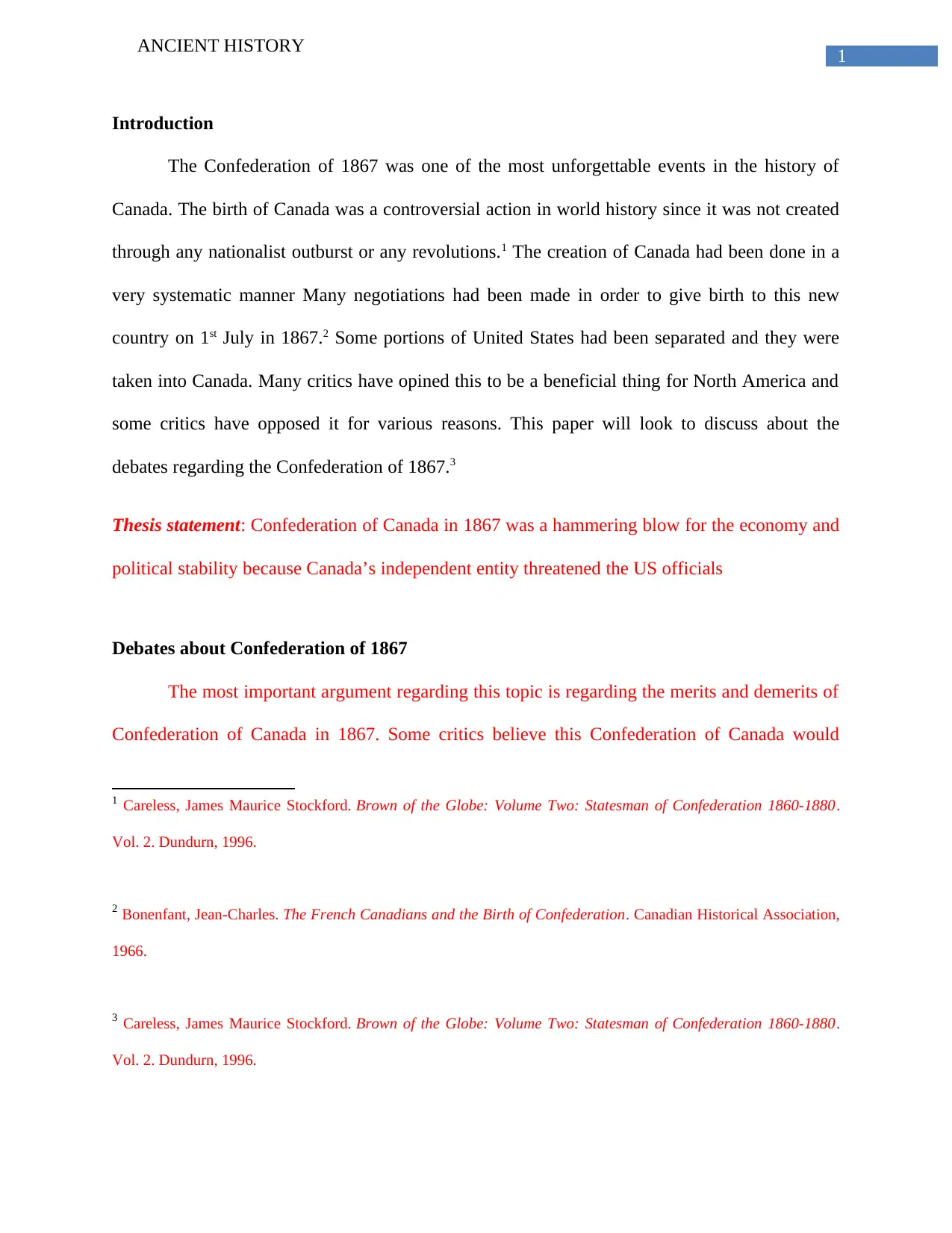
1
ANCIENT HISTORY
Introduction
The Confederation of 1867 was one of the most unforgettable events in the history of
Canada. The birth of Canada was a controversial action in world history since it was not created
through any nationalist outburst or any revolutions.1 The creation of Canada had been done in a
very systematic manner Many negotiations had been made in order to give birth to this new
country on 1st July in 1867.2 Some portions of United States had been separated and they were
taken into Canada. Many critics have opined this to be a beneficial thing for North America and
some critics have opposed it for various reasons. This paper will look to discuss about the
debates regarding the Confederation of 1867.3
Thesis statement: Confederation of Canada in 1867 was a hammering blow for the economy and
political stability because Canada’s independent entity threatened the US officials
Debates about Confederation of 1867
The most important argument regarding this topic is regarding the merits and demerits of
Confederation of Canada in 1867. Some critics believe this Confederation of Canada would
1 Careless, James Maurice Stockford. Brown of the Globe: Volume Two: Statesman of Confederation 1860-1880.
Vol. 2. Dundurn, 1996.
2 Bonenfant, Jean-Charles. The French Canadians and the Birth of Confederation. Canadian Historical Association,
1966.
3 Careless, James Maurice Stockford. Brown of the Globe: Volume Two: Statesman of Confederation 1860-1880.
Vol. 2. Dundurn, 1996.
ANCIENT HISTORY
Introduction
The Confederation of 1867 was one of the most unforgettable events in the history of
Canada. The birth of Canada was a controversial action in world history since it was not created
through any nationalist outburst or any revolutions.1 The creation of Canada had been done in a
very systematic manner Many negotiations had been made in order to give birth to this new
country on 1st July in 1867.2 Some portions of United States had been separated and they were
taken into Canada. Many critics have opined this to be a beneficial thing for North America and
some critics have opposed it for various reasons. This paper will look to discuss about the
debates regarding the Confederation of 1867.3
Thesis statement: Confederation of Canada in 1867 was a hammering blow for the economy and
political stability because Canada’s independent entity threatened the US officials
Debates about Confederation of 1867
The most important argument regarding this topic is regarding the merits and demerits of
Confederation of Canada in 1867. Some critics believe this Confederation of Canada would
1 Careless, James Maurice Stockford. Brown of the Globe: Volume Two: Statesman of Confederation 1860-1880.
Vol. 2. Dundurn, 1996.
2 Bonenfant, Jean-Charles. The French Canadians and the Birth of Confederation. Canadian Historical Association,
1966.
3 Careless, James Maurice Stockford. Brown of the Globe: Volume Two: Statesman of Confederation 1860-1880.
Vol. 2. Dundurn, 1996.
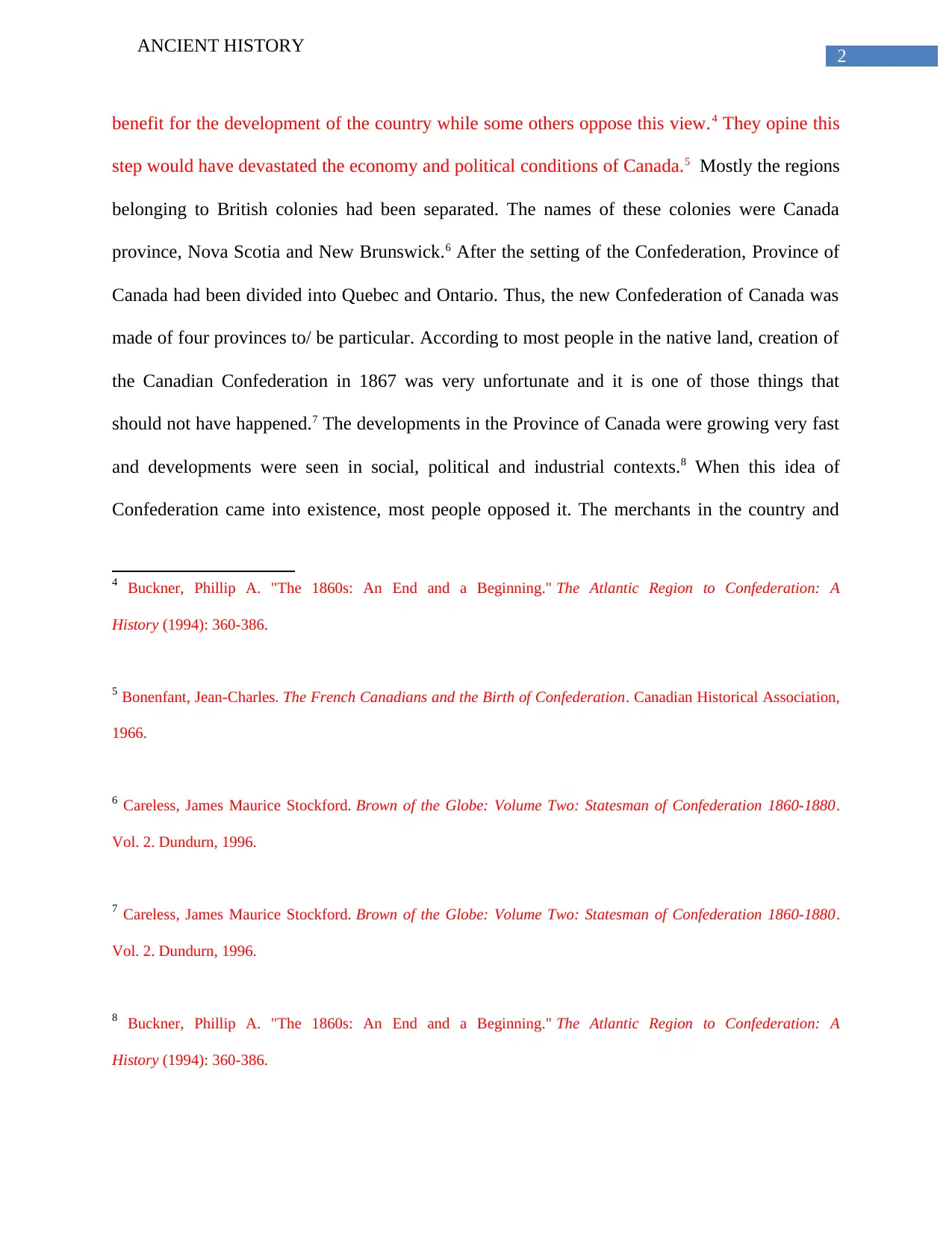
2
ANCIENT HISTORY
benefit for the development of the country while some others oppose this view.4 They opine this
step would have devastated the economy and political conditions of Canada.5 Mostly the regions
belonging to British colonies had been separated. The names of these colonies were Canada
province, Nova Scotia and New Brunswick.6 After the setting of the Confederation, Province of
Canada had been divided into Quebec and Ontario. Thus, the new Confederation of Canada was
made of four provinces to/ be particular. According to most people in the native land, creation of
the Canadian Confederation in 1867 was very unfortunate and it is one of those things that
should not have happened.7 The developments in the Province of Canada were growing very fast
and developments were seen in social, political and industrial contexts.8 When this idea of
Confederation came into existence, most people opposed it. The merchants in the country and
4 Buckner, Phillip A. "The 1860s: An End and a Beginning." The Atlantic Region to Confederation: A
History (1994): 360-386.
5 Bonenfant, Jean-Charles. The French Canadians and the Birth of Confederation. Canadian Historical Association,
1966.
6 Careless, James Maurice Stockford. Brown of the Globe: Volume Two: Statesman of Confederation 1860-1880.
Vol. 2. Dundurn, 1996.
7 Careless, James Maurice Stockford. Brown of the Globe: Volume Two: Statesman of Confederation 1860-1880.
Vol. 2. Dundurn, 1996.
8 Buckner, Phillip A. "The 1860s: An End and a Beginning." The Atlantic Region to Confederation: A
History (1994): 360-386.
ANCIENT HISTORY
benefit for the development of the country while some others oppose this view.4 They opine this
step would have devastated the economy and political conditions of Canada.5 Mostly the regions
belonging to British colonies had been separated. The names of these colonies were Canada
province, Nova Scotia and New Brunswick.6 After the setting of the Confederation, Province of
Canada had been divided into Quebec and Ontario. Thus, the new Confederation of Canada was
made of four provinces to/ be particular. According to most people in the native land, creation of
the Canadian Confederation in 1867 was very unfortunate and it is one of those things that
should not have happened.7 The developments in the Province of Canada were growing very fast
and developments were seen in social, political and industrial contexts.8 When this idea of
Confederation came into existence, most people opposed it. The merchants in the country and
4 Buckner, Phillip A. "The 1860s: An End and a Beginning." The Atlantic Region to Confederation: A
History (1994): 360-386.
5 Bonenfant, Jean-Charles. The French Canadians and the Birth of Confederation. Canadian Historical Association,
1966.
6 Careless, James Maurice Stockford. Brown of the Globe: Volume Two: Statesman of Confederation 1860-1880.
Vol. 2. Dundurn, 1996.
7 Careless, James Maurice Stockford. Brown of the Globe: Volume Two: Statesman of Confederation 1860-1880.
Vol. 2. Dundurn, 1996.
8 Buckner, Phillip A. "The 1860s: An End and a Beginning." The Atlantic Region to Confederation: A
History (1994): 360-386.
⊘ This is a preview!⊘
Do you want full access?
Subscribe today to unlock all pages.

Trusted by 1+ million students worldwide
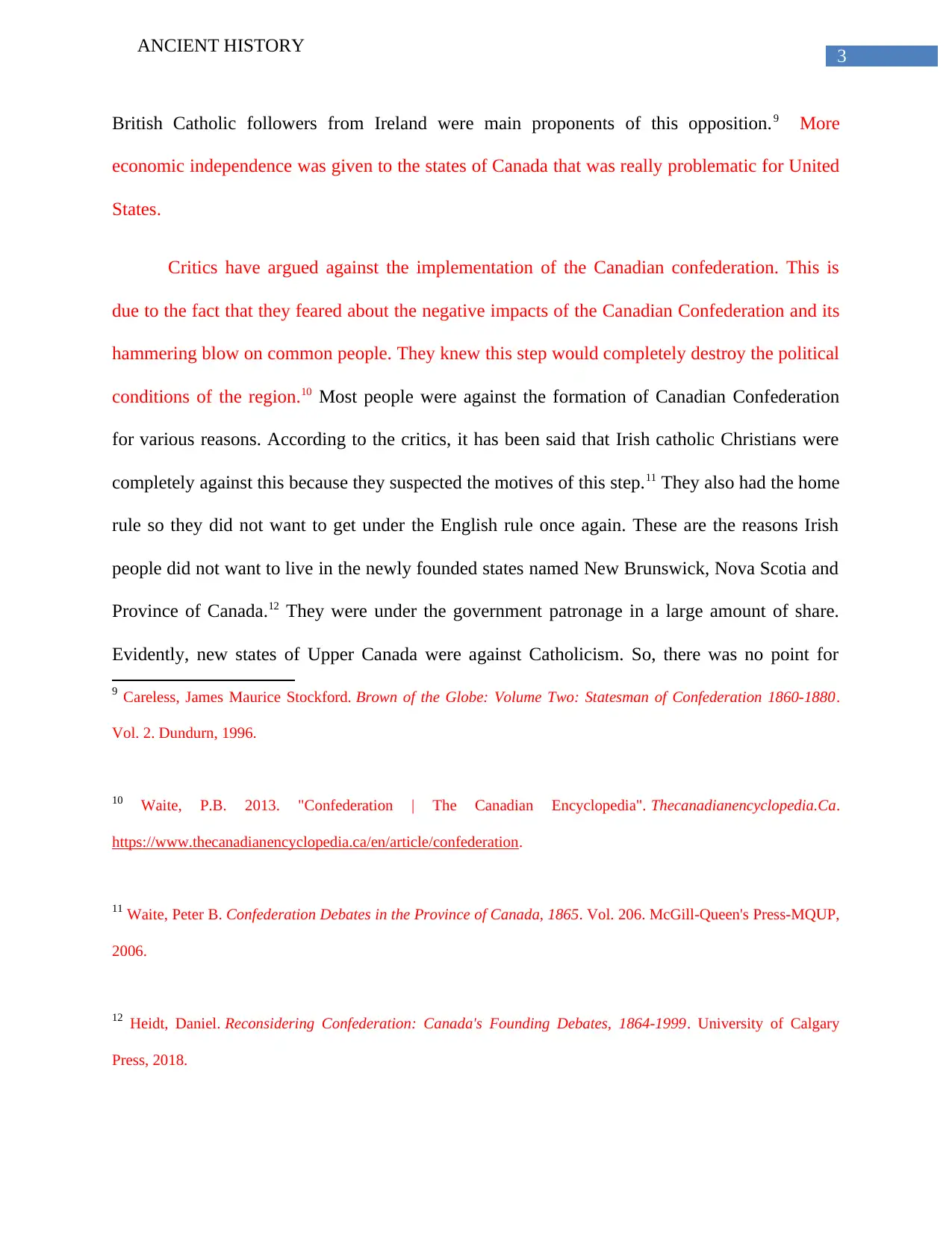
3
ANCIENT HISTORY
British Catholic followers from Ireland were main proponents of this opposition.9 More
economic independence was given to the states of Canada that was really problematic for United
States.
Critics have argued against the implementation of the Canadian confederation. This is
due to the fact that they feared about the negative impacts of the Canadian Confederation and its
hammering blow on common people. They knew this step would completely destroy the political
conditions of the region.10 Most people were against the formation of Canadian Confederation
for various reasons. According to the critics, it has been said that Irish catholic Christians were
completely against this because they suspected the motives of this step.11 They also had the home
rule so they did not want to get under the English rule once again. These are the reasons Irish
people did not want to live in the newly founded states named New Brunswick, Nova Scotia and
Province of Canada.12 They were under the government patronage in a large amount of share.
Evidently, new states of Upper Canada were against Catholicism. So, there was no point for
9 Careless, James Maurice Stockford. Brown of the Globe: Volume Two: Statesman of Confederation 1860-1880.
Vol. 2. Dundurn, 1996.
10 Waite, P.B. 2013. "Confederation | The Canadian Encyclopedia". Thecanadianencyclopedia.Ca.
https://www.thecanadianencyclopedia.ca/en/article/confederation.
11 Waite, Peter B. Confederation Debates in the Province of Canada, 1865. Vol. 206. McGill-Queen's Press-MQUP,
2006.
12 Heidt, Daniel. Reconsidering Confederation: Canada's Founding Debates, 1864-1999. University of Calgary
Press, 2018.
ANCIENT HISTORY
British Catholic followers from Ireland were main proponents of this opposition.9 More
economic independence was given to the states of Canada that was really problematic for United
States.
Critics have argued against the implementation of the Canadian confederation. This is
due to the fact that they feared about the negative impacts of the Canadian Confederation and its
hammering blow on common people. They knew this step would completely destroy the political
conditions of the region.10 Most people were against the formation of Canadian Confederation
for various reasons. According to the critics, it has been said that Irish catholic Christians were
completely against this because they suspected the motives of this step.11 They also had the home
rule so they did not want to get under the English rule once again. These are the reasons Irish
people did not want to live in the newly founded states named New Brunswick, Nova Scotia and
Province of Canada.12 They were under the government patronage in a large amount of share.
Evidently, new states of Upper Canada were against Catholicism. So, there was no point for
9 Careless, James Maurice Stockford. Brown of the Globe: Volume Two: Statesman of Confederation 1860-1880.
Vol. 2. Dundurn, 1996.
10 Waite, P.B. 2013. "Confederation | The Canadian Encyclopedia". Thecanadianencyclopedia.Ca.
https://www.thecanadianencyclopedia.ca/en/article/confederation.
11 Waite, Peter B. Confederation Debates in the Province of Canada, 1865. Vol. 206. McGill-Queen's Press-MQUP,
2006.
12 Heidt, Daniel. Reconsidering Confederation: Canada's Founding Debates, 1864-1999. University of Calgary
Press, 2018.
Paraphrase This Document
Need a fresh take? Get an instant paraphrase of this document with our AI Paraphraser
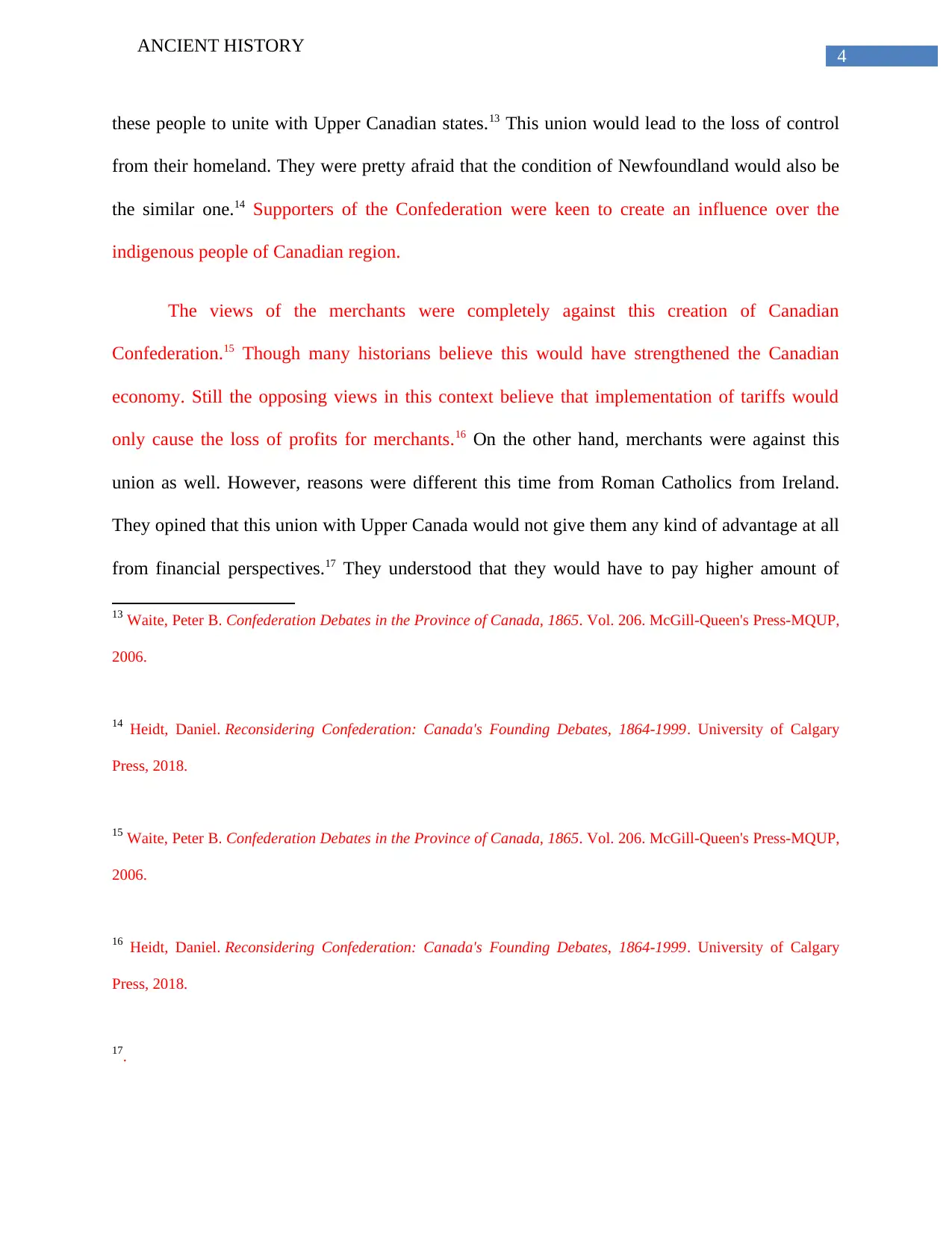
4
ANCIENT HISTORY
these people to unite with Upper Canadian states.13 This union would lead to the loss of control
from their homeland. They were pretty afraid that the condition of Newfoundland would also be
the similar one.14 Supporters of the Confederation were keen to create an influence over the
indigenous people of Canadian region.
The views of the merchants were completely against this creation of Canadian
Confederation.15 Though many historians believe this would have strengthened the Canadian
economy. Still the opposing views in this context believe that implementation of tariffs would
only cause the loss of profits for merchants.16 On the other hand, merchants were against this
union as well. However, reasons were different this time from Roman Catholics from Ireland.
They opined that this union with Upper Canada would not give them any kind of advantage at all
from financial perspectives.17 They understood that they would have to pay higher amount of
13 Waite, Peter B. Confederation Debates in the Province of Canada, 1865. Vol. 206. McGill-Queen's Press-MQUP,
2006.
14 Heidt, Daniel. Reconsidering Confederation: Canada's Founding Debates, 1864-1999. University of Calgary
Press, 2018.
15 Waite, Peter B. Confederation Debates in the Province of Canada, 1865. Vol. 206. McGill-Queen's Press-MQUP,
2006.
16 Heidt, Daniel. Reconsidering Confederation: Canada's Founding Debates, 1864-1999. University of Calgary
Press, 2018.
17.
ANCIENT HISTORY
these people to unite with Upper Canadian states.13 This union would lead to the loss of control
from their homeland. They were pretty afraid that the condition of Newfoundland would also be
the similar one.14 Supporters of the Confederation were keen to create an influence over the
indigenous people of Canadian region.
The views of the merchants were completely against this creation of Canadian
Confederation.15 Though many historians believe this would have strengthened the Canadian
economy. Still the opposing views in this context believe that implementation of tariffs would
only cause the loss of profits for merchants.16 On the other hand, merchants were against this
union as well. However, reasons were different this time from Roman Catholics from Ireland.
They opined that this union with Upper Canada would not give them any kind of advantage at all
from financial perspectives.17 They understood that they would have to pay higher amount of
13 Waite, Peter B. Confederation Debates in the Province of Canada, 1865. Vol. 206. McGill-Queen's Press-MQUP,
2006.
14 Heidt, Daniel. Reconsidering Confederation: Canada's Founding Debates, 1864-1999. University of Calgary
Press, 2018.
15 Waite, Peter B. Confederation Debates in the Province of Canada, 1865. Vol. 206. McGill-Queen's Press-MQUP,
2006.
16 Heidt, Daniel. Reconsidering Confederation: Canada's Founding Debates, 1864-1999. University of Calgary
Press, 2018.
17.
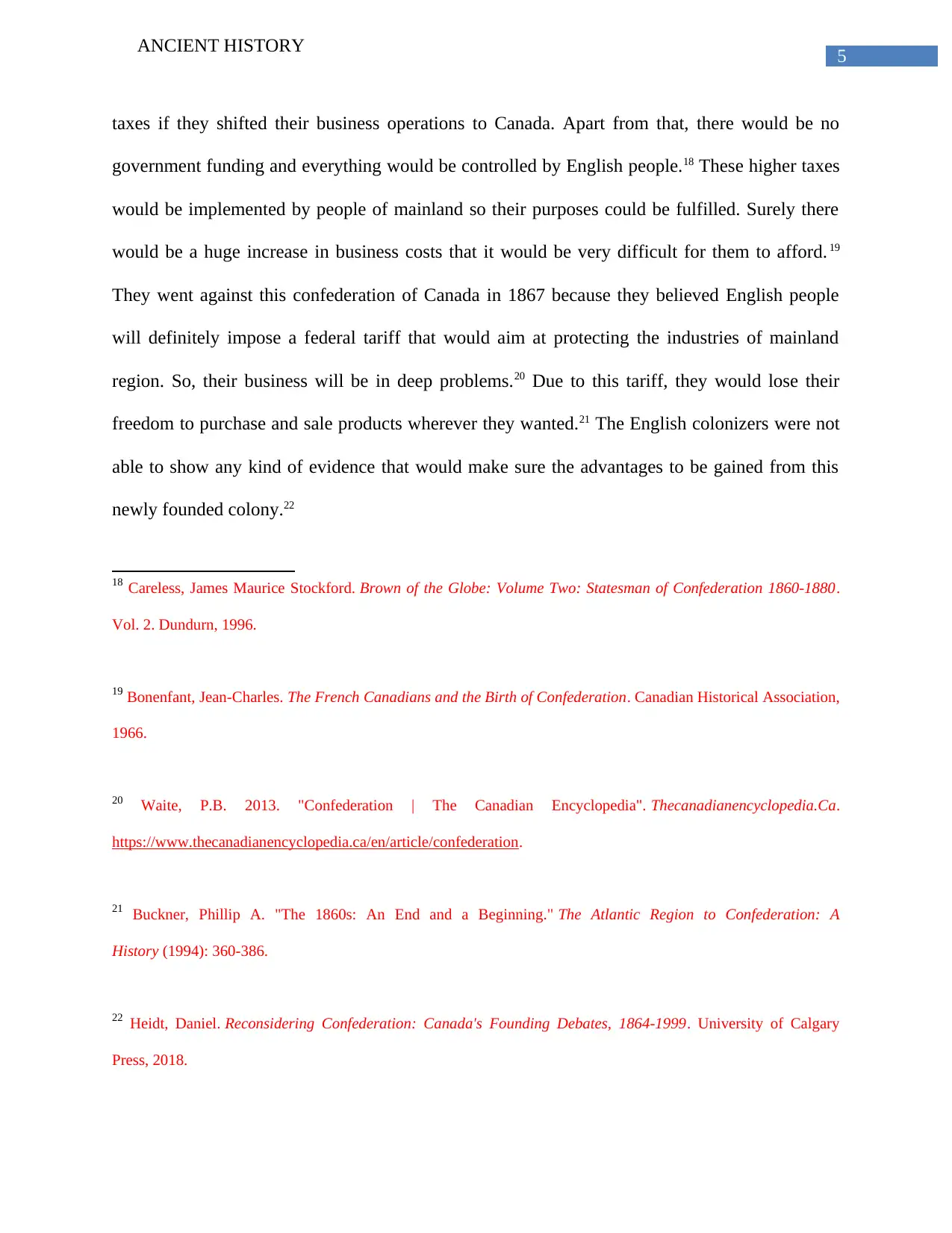
5
ANCIENT HISTORY
taxes if they shifted their business operations to Canada. Apart from that, there would be no
government funding and everything would be controlled by English people.18 These higher taxes
would be implemented by people of mainland so their purposes could be fulfilled. Surely there
would be a huge increase in business costs that it would be very difficult for them to afford. 19
They went against this confederation of Canada in 1867 because they believed English people
will definitely impose a federal tariff that would aim at protecting the industries of mainland
region. So, their business will be in deep problems.20 Due to this tariff, they would lose their
freedom to purchase and sale products wherever they wanted.21 The English colonizers were not
able to show any kind of evidence that would make sure the advantages to be gained from this
newly founded colony.22
18 Careless, James Maurice Stockford. Brown of the Globe: Volume Two: Statesman of Confederation 1860-1880.
Vol. 2. Dundurn, 1996.
19 Bonenfant, Jean-Charles. The French Canadians and the Birth of Confederation. Canadian Historical Association,
1966.
20 Waite, P.B. 2013. "Confederation | The Canadian Encyclopedia". Thecanadianencyclopedia.Ca.
https://www.thecanadianencyclopedia.ca/en/article/confederation.
21 Buckner, Phillip A. "The 1860s: An End and a Beginning." The Atlantic Region to Confederation: A
History (1994): 360-386.
22 Heidt, Daniel. Reconsidering Confederation: Canada's Founding Debates, 1864-1999. University of Calgary
Press, 2018.
ANCIENT HISTORY
taxes if they shifted their business operations to Canada. Apart from that, there would be no
government funding and everything would be controlled by English people.18 These higher taxes
would be implemented by people of mainland so their purposes could be fulfilled. Surely there
would be a huge increase in business costs that it would be very difficult for them to afford. 19
They went against this confederation of Canada in 1867 because they believed English people
will definitely impose a federal tariff that would aim at protecting the industries of mainland
region. So, their business will be in deep problems.20 Due to this tariff, they would lose their
freedom to purchase and sale products wherever they wanted.21 The English colonizers were not
able to show any kind of evidence that would make sure the advantages to be gained from this
newly founded colony.22
18 Careless, James Maurice Stockford. Brown of the Globe: Volume Two: Statesman of Confederation 1860-1880.
Vol. 2. Dundurn, 1996.
19 Bonenfant, Jean-Charles. The French Canadians and the Birth of Confederation. Canadian Historical Association,
1966.
20 Waite, P.B. 2013. "Confederation | The Canadian Encyclopedia". Thecanadianencyclopedia.Ca.
https://www.thecanadianencyclopedia.ca/en/article/confederation.
21 Buckner, Phillip A. "The 1860s: An End and a Beginning." The Atlantic Region to Confederation: A
History (1994): 360-386.
22 Heidt, Daniel. Reconsidering Confederation: Canada's Founding Debates, 1864-1999. University of Calgary
Press, 2018.
⊘ This is a preview!⊘
Do you want full access?
Subscribe today to unlock all pages.

Trusted by 1+ million students worldwide
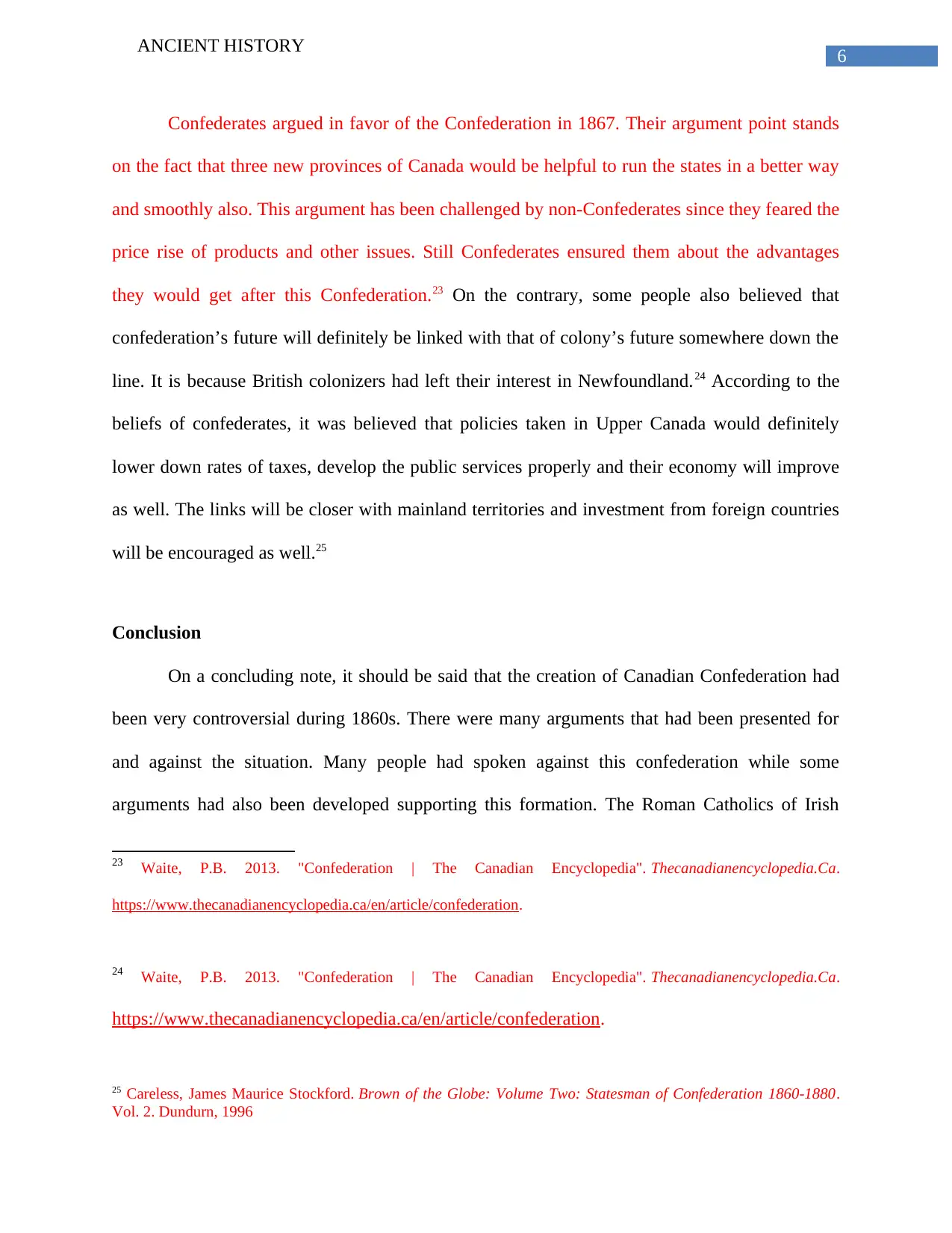
6
ANCIENT HISTORY
Confederates argued in favor of the Confederation in 1867. Their argument point stands
on the fact that three new provinces of Canada would be helpful to run the states in a better way
and smoothly also. This argument has been challenged by non-Confederates since they feared the
price rise of products and other issues. Still Confederates ensured them about the advantages
they would get after this Confederation.23 On the contrary, some people also believed that
confederation’s future will definitely be linked with that of colony’s future somewhere down the
line. It is because British colonizers had left their interest in Newfoundland.24 According to the
beliefs of confederates, it was believed that policies taken in Upper Canada would definitely
lower down rates of taxes, develop the public services properly and their economy will improve
as well. The links will be closer with mainland territories and investment from foreign countries
will be encouraged as well.25
Conclusion
On a concluding note, it should be said that the creation of Canadian Confederation had
been very controversial during 1860s. There were many arguments that had been presented for
and against the situation. Many people had spoken against this confederation while some
arguments had also been developed supporting this formation. The Roman Catholics of Irish
23 Waite, P.B. 2013. "Confederation | The Canadian Encyclopedia". Thecanadianencyclopedia.Ca.
https://www.thecanadianencyclopedia.ca/en/article/confederation.
24 Waite, P.B. 2013. "Confederation | The Canadian Encyclopedia". Thecanadianencyclopedia.Ca.
https://www.thecanadianencyclopedia.ca/en/article/confederation.
25 Careless, James Maurice Stockford. Brown of the Globe: Volume Two: Statesman of Confederation 1860-1880.
Vol. 2. Dundurn, 1996
ANCIENT HISTORY
Confederates argued in favor of the Confederation in 1867. Their argument point stands
on the fact that three new provinces of Canada would be helpful to run the states in a better way
and smoothly also. This argument has been challenged by non-Confederates since they feared the
price rise of products and other issues. Still Confederates ensured them about the advantages
they would get after this Confederation.23 On the contrary, some people also believed that
confederation’s future will definitely be linked with that of colony’s future somewhere down the
line. It is because British colonizers had left their interest in Newfoundland.24 According to the
beliefs of confederates, it was believed that policies taken in Upper Canada would definitely
lower down rates of taxes, develop the public services properly and their economy will improve
as well. The links will be closer with mainland territories and investment from foreign countries
will be encouraged as well.25
Conclusion
On a concluding note, it should be said that the creation of Canadian Confederation had
been very controversial during 1860s. There were many arguments that had been presented for
and against the situation. Many people had spoken against this confederation while some
arguments had also been developed supporting this formation. The Roman Catholics of Irish
23 Waite, P.B. 2013. "Confederation | The Canadian Encyclopedia". Thecanadianencyclopedia.Ca.
https://www.thecanadianencyclopedia.ca/en/article/confederation.
24 Waite, P.B. 2013. "Confederation | The Canadian Encyclopedia". Thecanadianencyclopedia.Ca.
https://www.thecanadianencyclopedia.ca/en/article/confederation.
25 Careless, James Maurice Stockford. Brown of the Globe: Volume Two: Statesman of Confederation 1860-1880.
Vol. 2. Dundurn, 1996
Paraphrase This Document
Need a fresh take? Get an instant paraphrase of this document with our AI Paraphraser

7
ANCIENT HISTORY
descent and merchants of Newfoundland went against the confederation while supporters of
confederation showed promises of development and strengthening o economy. All these
controversies had been suppressed later on by the economic crisis in North America.
ANCIENT HISTORY
descent and merchants of Newfoundland went against the confederation while supporters of
confederation showed promises of development and strengthening o economy. All these
controversies had been suppressed later on by the economic crisis in North America.
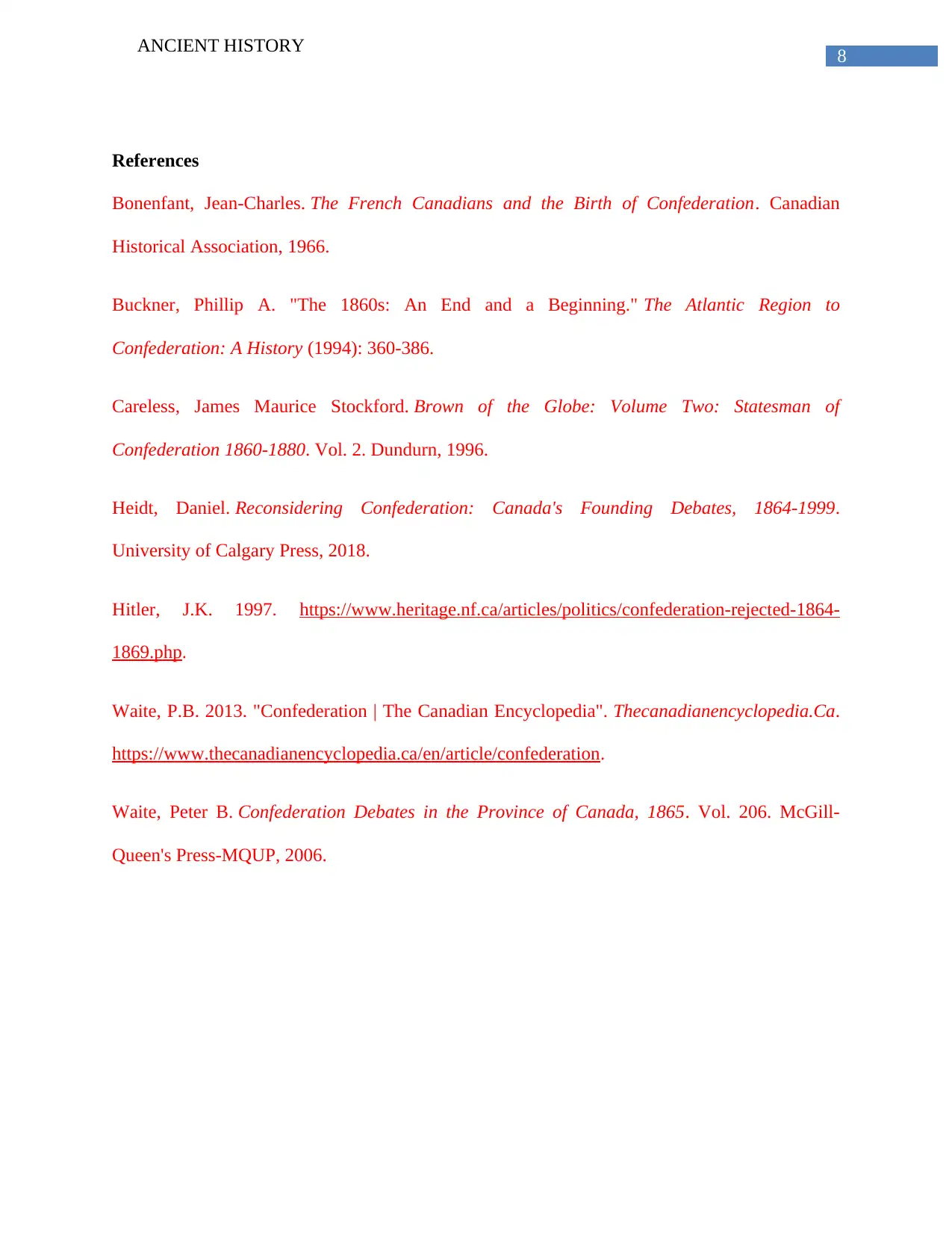
8
ANCIENT HISTORY
References
Bonenfant, Jean-Charles. The French Canadians and the Birth of Confederation. Canadian
Historical Association, 1966.
Buckner, Phillip A. "The 1860s: An End and a Beginning." The Atlantic Region to
Confederation: A History (1994): 360-386.
Careless, James Maurice Stockford. Brown of the Globe: Volume Two: Statesman of
Confederation 1860-1880. Vol. 2. Dundurn, 1996.
Heidt, Daniel. Reconsidering Confederation: Canada's Founding Debates, 1864-1999.
University of Calgary Press, 2018.
Hitler, J.K. 1997. https://www.heritage.nf.ca/articles/politics/confederation-rejected-1864-
1869.php.
Waite, P.B. 2013. "Confederation | The Canadian Encyclopedia". Thecanadianencyclopedia.Ca.
https://www.thecanadianencyclopedia.ca/en/article/confederation.
Waite, Peter B. Confederation Debates in the Province of Canada, 1865. Vol. 206. McGill-
Queen's Press-MQUP, 2006.
ANCIENT HISTORY
References
Bonenfant, Jean-Charles. The French Canadians and the Birth of Confederation. Canadian
Historical Association, 1966.
Buckner, Phillip A. "The 1860s: An End and a Beginning." The Atlantic Region to
Confederation: A History (1994): 360-386.
Careless, James Maurice Stockford. Brown of the Globe: Volume Two: Statesman of
Confederation 1860-1880. Vol. 2. Dundurn, 1996.
Heidt, Daniel. Reconsidering Confederation: Canada's Founding Debates, 1864-1999.
University of Calgary Press, 2018.
Hitler, J.K. 1997. https://www.heritage.nf.ca/articles/politics/confederation-rejected-1864-
1869.php.
Waite, P.B. 2013. "Confederation | The Canadian Encyclopedia". Thecanadianencyclopedia.Ca.
https://www.thecanadianencyclopedia.ca/en/article/confederation.
Waite, Peter B. Confederation Debates in the Province of Canada, 1865. Vol. 206. McGill-
Queen's Press-MQUP, 2006.
⊘ This is a preview!⊘
Do you want full access?
Subscribe today to unlock all pages.

Trusted by 1+ million students worldwide
1 out of 9
Related Documents
Your All-in-One AI-Powered Toolkit for Academic Success.
+13062052269
info@desklib.com
Available 24*7 on WhatsApp / Email
![[object Object]](/_next/static/media/star-bottom.7253800d.svg)
Unlock your academic potential
Copyright © 2020–2026 A2Z Services. All Rights Reserved. Developed and managed by ZUCOL.



